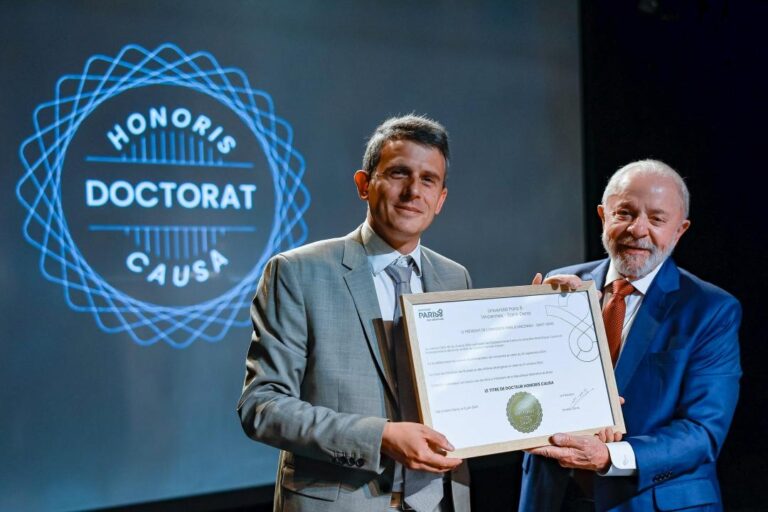Brazilian President Luiz Inácio Lula da Silva highlighted the transformative power of education during a recent ceremony in France, where he was awarded an Honorary Doctorate. Speaking at the event, Lula underscored education’s critical role in fostering social emancipation and reducing inequality. The honor, bestowed by a prestigious French institution, marks a significant recognition of his long-standing advocacy for inclusive educational policies aimed at empowering marginalized communities.
Lula Highlights Education as a Key Driver for Social Freedom and Equality
During the prestigious ceremony awarding him an Honorary Doctorate, President Lula underscored the transformative power of education as a fundamental pillar for achieving social freedom and equality across Brazil. He articulated that education transcends mere knowledge acquisition, serving as a catalyst for empowering marginalized communities and dismantling systemic barriers. Lula emphasized that accessible, quality education equips citizens with the tools necessary to actively participate in democracy, economically uplift themselves, and foster inclusive growth.
Highlighting key focus areas, Lula called for a comprehensive educational framework designed to:
- Promote equal opportunities irrespective of socio-economic background.
- Integrate critical thinking and creativity into curricula to prepare future generations for global challenges.
- Expand technical and vocational training to meet evolving labor market demands.
He stressed that these components are essential for ensuring education’s role as an agent of emancipation, capable of bridging social divides and nurturing a fairer society.
| Program Focus | Impact |
|---|---|
| Scholarships for Underprivileged Youth | Increased Higher Education Enrollment |
| Community Learning Centers | Local Engagement & Skill Development |
| Technological Access Initiatives | Digital Inclusion and Literacy |
President Stresses the Role of Inclusive Policies in Expanding Access to Quality Learning
President Lula underscored the transformative power of inclusive educational policies in broadening opportunities for all Brazilian citizens during his recent visit to France. Highlighting education as a fundamental driver of social emancipation, he called for sustained efforts to eliminate barriers that prevent marginalized communities from accessing quality learning environments. According to the president, fostering inclusivity is not merely an act of social justice but a necessary step to ensure Brazil’s sustainable development and global competitiveness in the decades ahead.
Addressing an audience of academic leaders and policymakers, President Lula emphasized key strategies aimed at expanding educational access:
- Investing in infrastructure to reach remote and underserved areas
- Developing culturally relevant curricula that reflect Brazil’s diverse population
- Strengthening teacher training programs to improve instructional quality
- Promoting lifelong learning initiatives that empower citizens beyond traditional schooling
Calls for Global Cooperation to Strengthen Educational Systems and Reduce Inequality
During the prestigious award ceremony in France, President Lula highlighted the urgent need for countries to unite in their efforts to enhance educational frameworks globally. He underscored that education is not merely a tool for personal advancement but a fundamental vehicle for social emancipation and economic equality. Lula called on world leaders to collaborate on innovative policies that bridge existing gaps, especially in marginalized communities, emphasizing that inclusive education must be prioritized to break cycles of poverty and disenfranchisement.
Amplifying this vision, Lula proposed several strategic areas for global partnership, including:
- Investment in teacher training: Elevating educators’ skills to meet diverse learner needs.
- Digital accessibility: Expanding access to technology as a means to democratize learning opportunities.
- Cultural exchange programs: Promoting understanding and solidarity among youth worldwide.
| Focus Area | Global Impact | Expected Outcome |
|---|---|---|
| Teacher Training | Improved quality of instruction | Higher student retention & success |
| Digital Inclusion | Wider access across regions | Equal learning opportunities |
| Cultural Exchange | Enhanced mutual respect | Stronger global community |
Recommends Investment in Lifelong Learning to Empower Future Generations
Brazil’s President Lula highlighted the transformative power of education during his acceptance of an Honorary Doctorate in France, advocating for sustained investment in lifelong learning. Emphasizing education as a fundamental tool for emancipation, he called on governments and private sectors alike to prioritize resources that foster skills development throughout all stages of life. His remarks underscored the urgent need to equip future generations with adaptable knowledge and critical thinking abilities to navigate the complexities of a rapidly changing world.
During the ceremony, Lula outlined key areas where focus should be intensified to maximize the impact of education policies, including:
- Access to quality education from early childhood to adulthood
- Inclusive learning environments that support diverse communities
- Digital literacy to bridge technological divides
- Promotion of innovation and creativity in curricula
These initiatives, he argued, will empower individuals not only to secure better economic opportunities but also to actively participate in democratic societies.
The Conclusion
In receiving an Honorary Doctorate in France, President Lula has once again underscored the transformative power of education as a cornerstone for individual and societal emancipation. His remarks highlight the vital role that accessible, quality education plays in fostering equality and driving sustainable development. As global challenges persist, Lula’s message resonates with policymakers and educators alike, reaffirming education’s place at the heart of efforts to build a more inclusive and empowered world.




